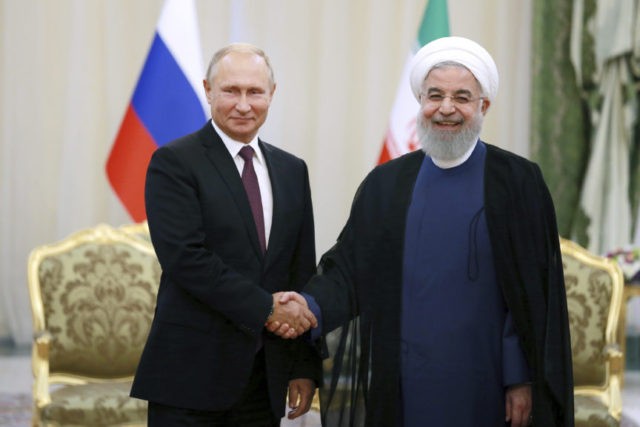Russia and South Korea both announced plans this week to continue doing business with Iran despite the heavier round of U.S. sanctions that went into effect on November 5.
Russia managed to find a way to toss Iran a lifeline while simultaneously profiting from Tehran’s misery. Meanwhile, South Korea made arrangements to continue trading with Iran using South Korea’s currency.
Russia, which unlike South Korea did not receive a temporary waiver from the sanctions, said it would defy American demands and continue buying at least 100,000 barrels of oil per day from Iran, which is a key Russian ally in the Middle East.
However, the Russians stipulated they would pay for the Iranian oil with Russian food and equipment, plus increased Russian investment in Iran’s sanctions-suppressed oil industry. At the same time, Russia is ramping up its own oil output and seizing market share from Tehran.
The Europeans, who grumbled about U.S. sanctions but largely complied with them, are particularly interested in shifting to Russian supplies because, for various technical reasons, Russian products are the most convenient replacement for Iranian crude. Turkish and Chinese importers are also finding a switch to Russian oil is easier and safer than defying U.S. sanctions, as their governments originally vowed to do.
The results, as reported by the Wall Street Journal on Thursday, are very bad news for Iran but delightful for the Russian oil industry:
On Tuesday, Rosneft reported a three-fold jump in net income to 451 billion rubles ($6.8 billion) for the first nine months of 2018 compared with the same period last year, mostly due to a production boost and higher prices for Urals.
The same replacement effect came about in China, which cut oil imports from Iran by 34% in September year-on year, while Russian sales rose by 7%.
In South Korea, Tehran’s oil sales collapsed in August, falling 85% on an annual basis. Russian shipments rose by 20% the same month, according to South Korean customs.
South Korea did receive a six-month waiver from U.S. sanctions, with the expectation it would begin dramatically reducing Iranian oil imports. Iran’s state-run PressTV portrayed an agreement reached by South Korean officials visiting Tehran over the weekend as Seoul signing on to a plan that will undermine U.S. sanctions, but the original Yonhap News report made it clear the South Korean delegation was merely explaining how the sanctions will work:
A team of South Korean officials visited Tehran on the weekend, just before the U.S. announcement of waivers on its Iranian oil embargo, and offered a detailed briefing on Seoul’s related agreement with Washington, a diplomatic source here said Tuesday.
The move reflects South Korea’s resolve to maintain relatively good relations with Iran despite the revival of U.S. sanctions on the Middle Eastern country’s energy and financial sectors.
The delegation, led by Deputy Foreign Minister for Economic Affairs Yun Kang-hyeon, met with Iranian officials on Saturday and explained the content and background of the waiver deal in detail, according to the source.
As Yonhap explained, Seoul wishes to “cooperate with Washington on its efforts to tighten the screws on Tehran for its nuclear program,” while also taking advantage of the sanctions waiver granted by the United States and maintaining commerce that is not forbidden by the sanctions. To that end, South Korea’s won currency will be employed to facilitate transactions through the Iranian central bank’s accounts in South Korea.
“It’s expected to provide South Korean firms with more opportunities for the trade of non-sanctions items such as medical products, processed food, and home appliances, although the exports of some products including steel and automobile parts will be affected by the sanctions,” a diplomatic source in Seoul explained.
The South Korean delegation was also eager to ensure Iran would be able to pay some $200 million in outstanding debts to South Korean exporters. The Iranians reportedly responded “positively” to these requests.

COMMENTS
Please let us know if you're having issues with commenting.